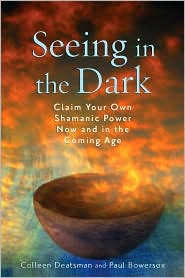I think I’m reaching the point with (core) shamanism 101 books that I hit with totemism 101 books a few years ago–I’m getting tired of them, and want to see something besides rehashes of the same stuff. I had really hoped, when I read the first few pages of Seeing in the Dark, that it would be something different: the authors spoke of the many ecological and social injustices that we face today, and hinted that shamanism could be a tool for counteracting these destructive forces. Instead, what I got was the usual core shamanism 101 material: journeying without risk, lots of nice helper spirits, medicine wheels, and healing techniques. While these things certainly can be used in making the world a better place, the emphasis was mainly on self-help and other core shamanism standards.
Mind you, it’s good core shamanism 101 material. The book is a pretty complete guide to the basics. Granted, it’s the same thing you’ll find in any of a number of other core shamanism books, albeit with the authors’ own unique way of describing it and the reasons behind it, but this would make a good beginner’s book with a lot of material. And the authors have a keen sense of the human psyche and how to use shamanic techniques to heal it–again, standard core shamanism fare, but they present it in a nicely written fashion, backed up with a decent assortment of practices.
The material sometimes contradicts itself. For example, when talking about helping spirits, on p. 101 the authors quote another writer who essentially says that if you meet a hostile spirit, it always means there’s something wrong with you and your approach that you’re projecting. But then on 113-116, the authors’ own material describes spirits that are hostile in and of themselves, particularly those that are reluctant to or incapable of passing over to the next life. On page 10 they say that modern shamanism isn’t about taking things from other cultures, and then on 132 openly encourage people to borrow freely from other cultures with no caveats. The authors decry the “I” culture of the modern United States, and then describe a form of shamanism that is mainly about the individual shaman getting things from the spirits–teachings and gifts–with almost nothing about giving back to the spirits, making offerings to them, or seeing what it is they need.
I won’t get into my standard disagreements with core shamanism. What I will say is that, contradictions aside, this is a good intro to core shamanism. It didn’t knock my socks off, as it were, but I’m also hard to impress. If you want the basics, and this title’s convenient to you, pick it up. Just be aware that there’s not much to differentiate it from any of a number of other similar titles.
~review by Lupa
Authors: Colleen Deatsman and Paul Bowersox
Weiser Books, 2009
240 pages, $16.95

